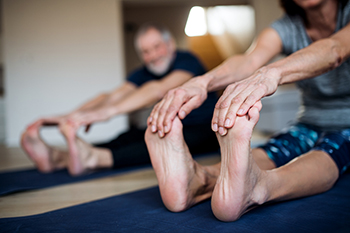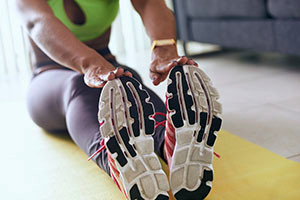Blog
Arch, Toe, and Achilles Tendon Stretches
 The feet are considered to be the foundation of the body, and can produce the ability to remain mobile and independent. Proper foot fitness can provide full range of motion, and this can help to keep the muscles, tendons, and ligaments healthy. It is beneficial to wear shoes that are flexible, in addition to performing specific foot stretches. These can include slowly rolling each foot on a tennis ball, which can help to strengthen the arch. Additionally, the Achilles tendon can remain flexible when a towel is placed around the bottom of the foot while in a seated position, and gently pulled upward. The toes can become stronger when each toe is lifted separately, or this can be accomplished by picking up marbles from the floor with your toes. If you would like more information about how frequently stretching the feet can improve the health of the overall body, it is suggested that you confer with a podiatrist.
The feet are considered to be the foundation of the body, and can produce the ability to remain mobile and independent. Proper foot fitness can provide full range of motion, and this can help to keep the muscles, tendons, and ligaments healthy. It is beneficial to wear shoes that are flexible, in addition to performing specific foot stretches. These can include slowly rolling each foot on a tennis ball, which can help to strengthen the arch. Additionally, the Achilles tendon can remain flexible when a towel is placed around the bottom of the foot while in a seated position, and gently pulled upward. The toes can become stronger when each toe is lifted separately, or this can be accomplished by picking up marbles from the floor with your toes. If you would like more information about how frequently stretching the feet can improve the health of the overall body, it is suggested that you confer with a podiatrist.
Why Stretching Is Important for Your Feet
Stretching the feet is a great way to prevent injuries. If you have any concerns with your feet consult with one of our podiatrists from Pennsylvania. Our doctors will assess your condition and provide you with quality foot and ankle treatment.
Stretching the Feet
Stretching the muscles in the foot is an important part in any physical activity. Feet that are tight can lead to less flexibility and make you more prone to injury. One of the most common forms of foot pain, plantar fasciitis, can be stretched out to help ease the pain. Stretching can not only ease pain from plantar fasciitis but also prevent it as well. However, it is important to see a podiatrist first to determine if stretching is right for you. Podiatrists can also recommend other ways to stretch your feet. Once you know whether stretching is right for you, here are some excellent stretches you can do.
- Using a foam roller or any cylindrical object (a water bottle or soda can will do), roll the object under your foot back and forth. You should also exert pressure on the object. Be sure to do this to both feet for a minute. Do this exercise three times each.
- Similar to the previous exercise, take a ball, such as a tennis ball, and roll it under your foot while seated and exert pressure on it.
- Grab a resistance band or towel and take a seat. If you are using a towel, fold it length wise. Next put either one between the ball of your foot and heel and pull with both hands on each side towards you. Hold this for 15 seconds and then switch feet. Do this three times for each foot.
- Finally hold your big toe while crossing one leg over the other. Pull the toe towards you and hold for 15 seconds. Once again do this three times per foot.
It is best to go easy when first stretching your foot and work your way up. If your foot starts hurting, stop exercising to ice and rest the foot. It is advised that you then see a podiatrist for help.
If you have any questions, please feel free to contact one of our offices located in Plymouth Meeting and Ambler, PA . We offer the newest diagnostic and treatment technologies for all your foot care needs.
Can Other Foot Problems Cause Plantar Fasciitis?
Plantar fasciitis is a condition characterized by inflammation of the plantar fascia, a ligament that runs along the bottom of the foot and connects the toes to the heel bone. This ailment is characterized by a sharp, stabbing heel pain that is at its worst when taking your first few steps after resting. There may also be pain along the arch of the foot. Although plantar fasciitis is an overuse injury often caused by repetitive movements that put excess strain on the ligament, having other foot conditions can make developing plantar fasciitis more likely. Problems such as heel spurs, abnormal foot biomechanics, flat feet, high arches, and arthritis can all impact your risk of getting plantar fasciitis. If you are experiencing the symptoms of this condition, please seek the care of a podiatrist.
Plantar fasciitis can be very painful and inconvenient. If you are experiencing heel pain or symptoms of plantar fasciitis, contact one of our podiatrists from Pennsylvania. Our doctors can provide the care you need to keep you pain-free and on your feet.
What Is Plantar Fasciitis?
Plantar fasciitis is the inflammation of the thick band of tissue that runs along the bottom of your foot, known as the plantar fascia, and causes mild to severe heel pain.
What Causes Plantar Fasciitis?
- Excessive running
- Non-supportive shoes
- Overpronation
- Repeated stretching and tearing of the plantar fascia
How Can It Be Treated?
- Conservative measures – anti-inflammatories, ice packs, stretching exercises, physical therapy, orthotic devices
- Shockwave therapy – sound waves are sent to the affected area to facilitate healing and are usually used for chronic cases of plantar fasciitis
- Surgery – usually only used as a last resort when all else fails. The plantar fascia can be surgically detached from the heel
While very treatable, plantar fasciitis is definitely not something that should be ignored. Especially in severe cases, speaking to your doctor right away is highly recommended to avoid complications and severe heel pain. Your podiatrist can work with you to provide the appropriate treatment options tailored to your condition.
If you have any questions please feel free to contact one of our offices located in Plymouth Meeting and Ambler, PA . We offer the newest diagnostic and treatment technologies for all your foot and ankle needs.
Gradually Increasing Speed and Mileage May Help to Prevent Running Injuries
 People who enjoy running may overlook foot pain, which in turn can develop into serious foot conditions. Research has indicated it is beneficial to practice proper warm-up and cool down routines, as this may be helpful in preventing running injuries. Patients who are new to the sport of running are advised to start slowly, and gradually increase their speed and mileage. Additionally, it is beneficial to alternate running shoes, which may be helpful in prolonging shock absorption. If you would like more information about how running injuries can affect the feet and how to prevent them, please consult with a podiatrist.
People who enjoy running may overlook foot pain, which in turn can develop into serious foot conditions. Research has indicated it is beneficial to practice proper warm-up and cool down routines, as this may be helpful in preventing running injuries. Patients who are new to the sport of running are advised to start slowly, and gradually increase their speed and mileage. Additionally, it is beneficial to alternate running shoes, which may be helpful in prolonging shock absorption. If you would like more information about how running injuries can affect the feet and how to prevent them, please consult with a podiatrist.
All runners should take extra precaution when trying to avoid injury. If you have any concerns about your feet, contact one of our podiatrists of Pennsylvania. Our doctors will treat your foot and ankle needs.
How to Prevent Running Injuries
There are a lot of mistakes a runner can make prior to a workout that can induce injury. A lot of athletes tend to overstretch before running, instead of saving those workouts for a post-run routine. Deep lunges and hand-to-toe hamstring pulls should be performed after a workout instead of during a warmup. Another common mistake is jumping into an intense routine before your body is physically prepared for it. You should try to ease your way into long-distance running instead of forcing yourself to rush into it.
More Tips for Preventing Injury
- Incorporate Strength Training into Workouts - This will help improve the body’s overall athleticism
- Improve and Maintain Your Flexibility – Stretching everyday will help improve overall performance
- “Warm Up” Before Running and “Cool Down” Afterward – A warm up of 5-10 minutes helps get rid of lactic acid in the muscles and prevents delayed muscle soreness
- Cross-Training is Crucial
- Wear Proper Running Shoes
- Have a Formal Gait Analysis – Poor biomechanics can easily cause injury
If you have any questions, please feel free to contact one of our offices located in Plymouth Meeting and Ambler, PA . We offer the newest diagnostic and treatment technologies for all your foot care needs.


